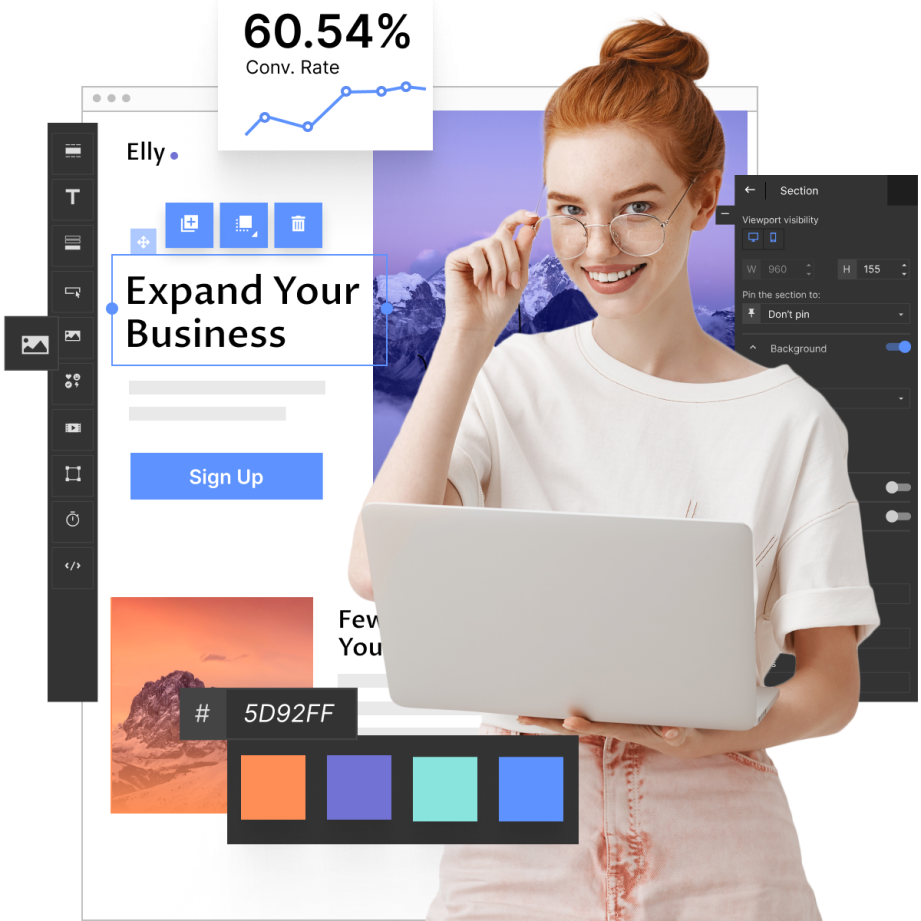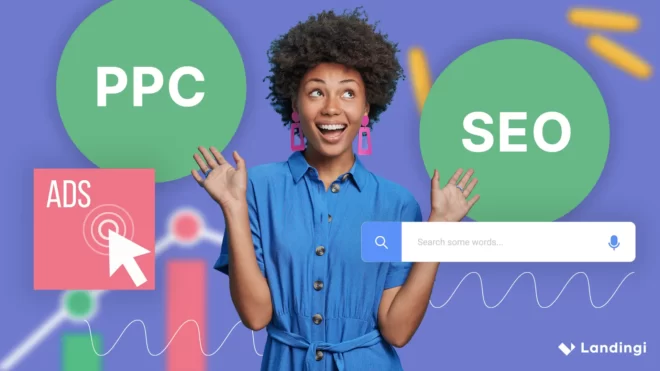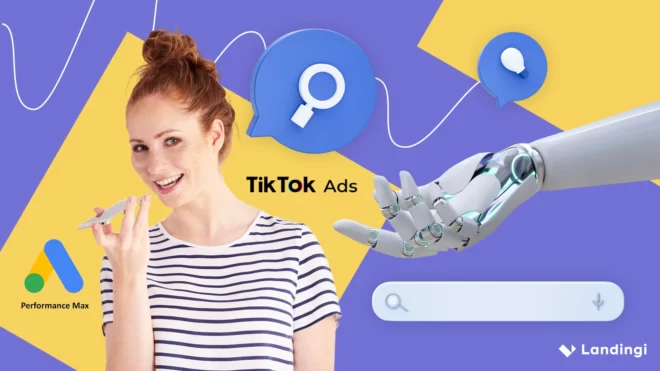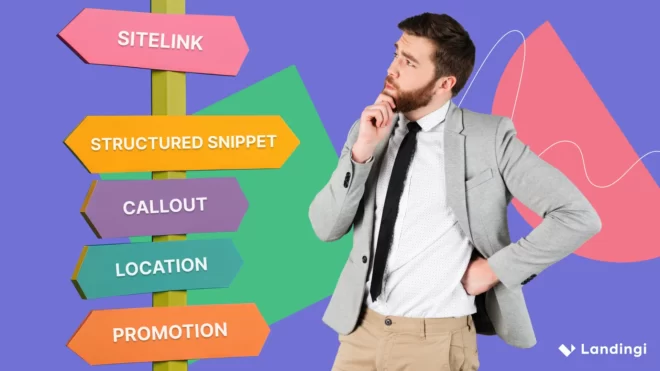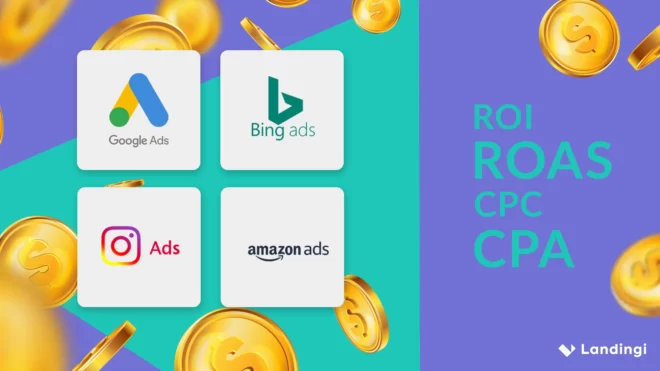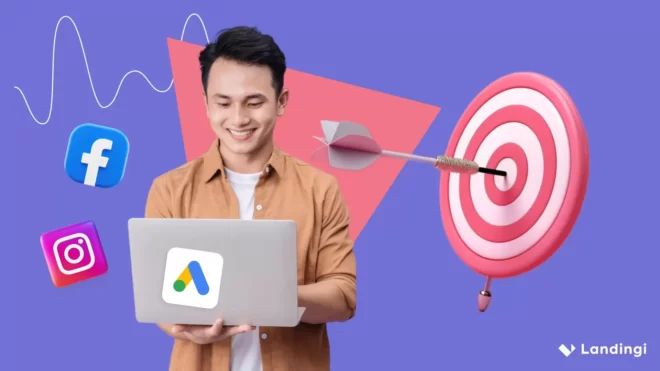PPC vs. SEO is a common debate in digital marketing, as both strategies offer unique benefits and serve distinct purposes. SEO enhances search engine rankings by optimizing content and design, gradually boosting organic traffic, while PPC achieves immediate visibility by purchasing ad space for specific keywords.
45% of small businesses use PPC advertising, according to Rank Tracker report, yet, as showcased in Social Champ statistics, ca. 61% of B2B marketers prefer SEO for lead generation. As Google handles around 8.5 billion searches daily, both strategies, when combined, can be highly beneficial for driving engagement and conversions.
If you struggle with the decision between PPC (Pay-Per-Click) advertising and SEO (Search Engine Optimization), this article delves into the key differences between both strategies, exploring their respective benefits and drawbacks to help you determine the best approach for your marketing goals.
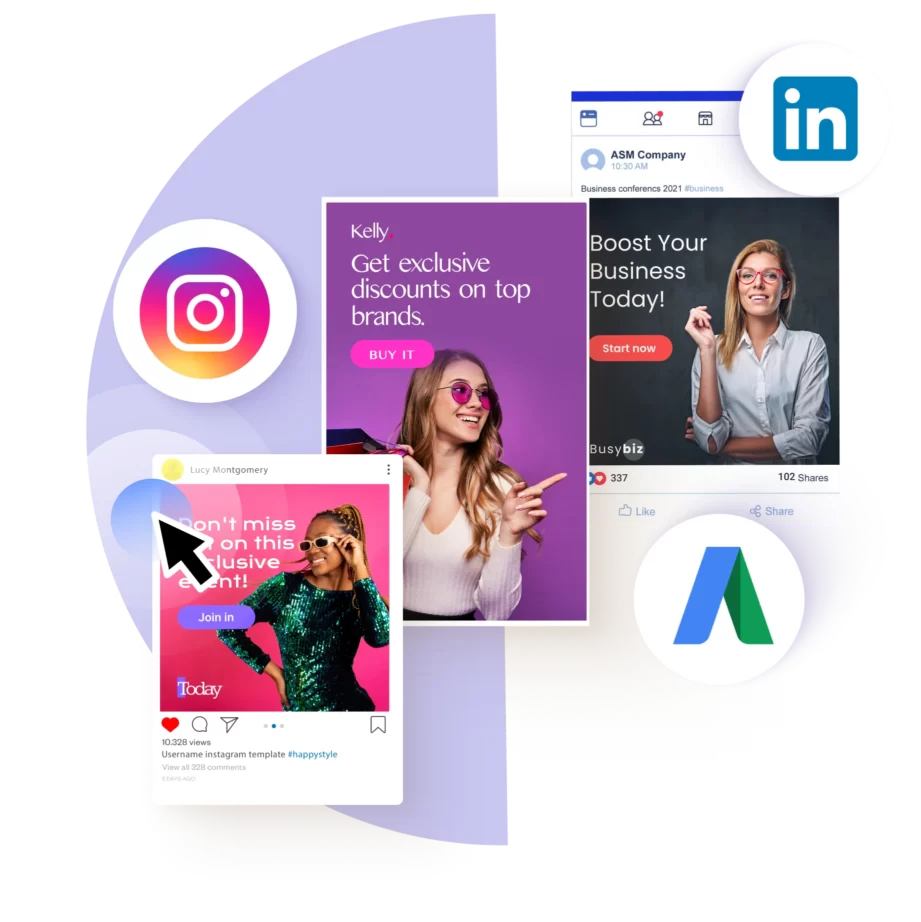
What Is PPC (Pay-Per-Click)?
PPC (Pay-Per-Click) is a digital marketing strategy and one of the most popular online advertising models, where a fee is charged each time the ad is clicked. PPC strategies allow advertisers to buy site visits rather than earn them organically. One of the most popular forms of PPC is search engine advertising, where advertisers bid for ad placement in a search engine’s sponsored links when someone searches for a keyword related to their business.
In PPC, advertisers create ads and bid on specific keywords relevant to their target audience. When users type these keywords into a search engine, the ads may appear at the top of the search results, labeled as “sponsored” or “ad.” If a user clicks on the ad, the advertiser is charged a predetermined amount. This model allows businesses to control their advertising budget and measure the effectiveness of their campaigns directly, as they only pay for actual clicks.
PPC campaigns can be highly targeted, enabling advertisers to reach specific demographics, geographical locations, and even times of day. Platforms like Google Ads and Microsoft Advertising (Bing Ads) are common choices for running PPC campaigns. Yet, advertisers can also choose social media advertising platforms, such as Meta Ads. Various PPC platforms offer multiple ad formats, including display, product, or video ads, which can appear directly on a chosen platform or across partner websites. With the right strategy, effective keyword management, and advanced targeting, PPC can be a powerful tool for driving traffic, generating leads, and boosting sales for businesses of all sizes.
Unlock PPC success with Landingi! Craft well-optimized PPC page to achieve higher ROI.
What Is SEO (Search Engine Optimization)?
SEO (Search Engine Optimization) is a digital marketing strategy that involves optimizing a website to improve its visibility and ranking on search engine results pages (SERPs). The primary goal of SEO is to attract organic (non-paid) traffic from search engines like Google, Bing, and Yahoo by ensuring that the website appears as high as possible for relevant search queries. SEO strategy involves optimizing various website elements, such as content, structure, and technical aspects, to align websites with search engines, e.g., Google, algorithms.
SEO encompasses a range of techniques and practices, including keyword research, on-page optimization (like improving meta tags, headings, and internal linking), and off-page optimization (such as acquiring backlinks from other reputable websites). Additionally, it involves technical SEO practices that enhance the site’s overall performance, such as improving page load speeds, ensuring mobile-friendliness, and maintaining a secure connection (HTTPS). By aligning the website’s content and structure with search engine algorithms, SEO helps businesses attract more targeted traffic, enhance user experience, and, ultimately, achieve higher conversion rates.
In detail, SEO involves 5 key elements, as follows:
- Keyword research – identifying the words and phrases potential customers use to search for products or services related to a specific business helps to understand what terms to target in content.
- On-page SEO – involves optimizing individual web pages to rank higher and earn more relevant traffic by using keywords strategically in titles, headers, meta descriptions, and throughout the content. It also refers to improving site speed, mobile friendliness, and user experience.
- Off-page SEO – enhancing a website’s authority and trustworthiness through external means. This often involves link building and acquiring backlinks from other reputable websites. Social media marketing and influencer outreach can also play a role in off-page SEO.
- Technical SEO – ensuring that a website meets the technical requirements of modern search engines for effective crawling and indexing. This includes optimizing the website’s structure, improving site speed, ensuring mobile compatibility, and creating an XML sitemap.
- Content creation – producing high-quality, relevant, and engaging content that addresses the needs and interests of your audience. Content optimized for SEO helps attract visitors and boosts the site’s authority and ranking.
Implementing SEO best practices helps businesses improve their online visibility, drive more organic traffic to their websites, and ultimately increase their chances of converting visitors into customers. SEO is an ongoing process that requires regular monitoring and adjustments to stay ahead of competitors and adapt to changing search engine algorithms. This strategy doesn’t give immediate results, yet it helps build long-term visibility and credibility for a website, leading to sustained organic traffic growth and higher search engine rankings over time.
Master SEO optimization with Landingi and boost your brand with well-designed landing pages.
What Is the Difference Between SEO and PPC?
The main difference between SEO (Search Engine Optimization) and PPC (Pay-per-Click) is that SEO strategy builds long-term organic reach, while PPC advertising refers to creating instant paid visibility. SEO and PPC are two prominent digital marketing strategies, but they differ fundamentally in their approach to attracting website traffic. The key distinctions involve the 5 main pillars, as follows:
1. Focus
- SEO optimizes your website and content to rank higher in search engine results pages (SERPs) for relevant keywords. Users discover your site organically through unpaid search.
- PPC involves creating targeted ads that appear at the top of SERPs, on partner websites, or across social media platforms, depending on the chosen advertisement channel. You pay a fee each time someone clicks on your ad.
2. Cost
- SEO is a cost-effective strategy in the long run, even though it requires ongoing maintenance. The primary investment involves time and expertise for optimization efforts.
- PPC involves direct costs charged for each ad click. You set a budget and bid on keywords, determining your overall advertising spend.
3. Results
- SEO gives long-term results, but establishing strong SEO takes time and consistent effort. It can take months to see significant ranking improvements.
- PPC delivers immediate results – ads appear when your campaign launches, driving traffic quickly.
4. Control
- In SEO, direct control over ranking is limited. While you can optimize your site for desired keywords, the algorithms search engines use to rank websites are complex and constantly evolving.
- PPC offers a high degree of control. You can set budgets, target specific demographics, and tailor ad creatives for maximum impact.
5. Sustainability
- SEO results, when well-established, can be sustainable over time, offering long-term organic traffic. However, ongoing optimization is crucial to maintain rankings.
- PPC offers a quick inflow of visitors, but it’s not a long-term solution on its own – traffic stops when you stop paying.
The optimal digital marketing approach often involves using both SEO and PPC in a cohesive strategy. SEO lays the foundation for long-term organic traffic, while PPC provides a targeted boost to reach your audience quickly.
SEO Advantages
The main advantages of SEO are its cost–effectiveness, its ability to increase organic traffic and improve brand credibility, reach target audiences, and keep the results long–term. SEO offers numerous advantages for businesses looking to enhance their online presence and drive growth, including the following:
- Increased organic traffic – the results of an SEO strategy, which refers to positioning a site at the top of the SERPs, translate into much more organic traffic and attract users actively searching for the products, services, or information you offer.
- Cost-effectiveness – SEO is an organic approach that doesn’t require ongoing direct payments for clicks, as in PPC strategies. While SEO efforts involve investment in time and potentially specialist expertise, the long-term returns can be substantial.
- Improved brand credibility – ranking highly in SERPs is a mark of trust and authority in the eyes of users and search engines alike. Strong SEO indicates a well-optimized, informative website, fostering user confidence and enhancing your brand’s credibility.
- Targeted audience reach – SEO allows you to target specific keywords your ideal audience will likely search for. By incorporating relevant keywords throughout your website content, you effectively connect with users who are genuinely interested in what you offer.
- Enhanced user experience – SEO best practices often overlap with creating a user-friendly website. Optimizing website structure, navigation, and content readability improves search engine ranking and provides a more positive experience for visitors, encouraging them to stay longer and engage more.
- Long-term benefits – SEO is an investment that yields long-term returns. Once you achieve a high ranking for your target keywords, the benefits increase over time. Organic traffic can provide a steady stream of qualified leads and conversions without ongoing financial input.
- Competitive advantage – by effectively optimizing your website, you can outrank competitors in search results, gaining valuable visibility and attracting potential customers who might otherwise have landed on your competitor’s site.
Furthermore, SEO provides valuable insights into customer behavior through analytics and reporting tools. Data gathered by using professional tools, like Google Analytics 4, or specific tools for tracking landing page performance, like EventTracker from Landingi, can help businesses better understand their audience, tailor their marketing strategies, and make informed decisions. By staying competitive in the search engine rankings, businesses can maintain a strong online presence and continually attract new customers.
Boost your brand with a professionally designed landing page tailored to your needs.
SEO Disadvantages
While SEO offers many benefits, it also has disadvantages, including its time–consuming approach, algorithm dependence, and high competitiveness in certain industries. These main cons can be challenging, as they refer to specific problems, as described below.
- Time-consuming approach – SEO requires significant time to see tangible results. It involves ongoing efforts, such as keyword research, content creation, link building, and technical optimizations. This long-term commitment can be challenging for businesses seeking immediate returns on their investment.
- Algorithm dependence – SEO success heavily depends on search engine algorithms, which can change frequently and unpredictably. Updates to these algorithms can affect rankings and traffic, often requiring businesses to quickly adapt their strategies to maintain their search visibility.
- Competitiveness and uncertainty – SEO is highly competitive, especially for popular keywords and industries. Achieving and maintaining high rankings can be difficult due to competitors’ constant efforts. Additionally, SEO outcomes are never guaranteed, making it a somewhat uncertain investment compared to other marketing strategies.
PPC Advantages
Many businesses choose to run paid marketing campaigns because of the advantages of PPC, which include immediate results, targeted advertising, and budget control. Pay-per-click (PPC) advertising offers beneficial opportunities for businesses to enhance their online presence and drive targeted traffic, particularly thanks to the following pros:
- Immediate results – PPC campaigns can generate traffic and leads almost immediately after launch. This makes PPC an ideal strategy for businesses looking to boost their visibility and sales quickly.
- Targeted advertising – PPC allows businesses to target their ads based on various factors such as keywords, demographics, location, time of day, and device type. This precise targeting ensures that ads are shown to the most relevant audience, increasing the likelihood of conversions.
- Measurable ROI – PPC provides detailed analytics and reporting, allowing businesses to track the performance of their campaigns in real time. Metrics such as clicks, impressions, conversions, and cost-per-click (CPC) help businesses understand their return on investment and make data-driven decisions to optimize their campaigns.
- Budget control – with PPC, businesses have complete control over their advertising budget. They can set daily or monthly spending limits and adjust them as needed. This flexibility ensures businesses can manage advertising costs effectively and scale their campaigns according to their financial capacity.
- Brand visibility – even if users do not click on the ads, the presence of a business’s ad at the top of search results, on popular websites, or across social media platforms can enhance brand awareness and credibility. This visibility can increase brand recognition, potentially influencing future purchasing decisions.
In essence, PPC offers a targeted and measurable way to reach your ideal audience, drive qualified traffic, and achieve your marketing objectives. It’s a powerful tool for businesses seeking immediate results and much control over their online advertising spend.
Use Landingi to optimize your paid campaigns and maximize ROI!
PPC Disadvantages
Despite its advantages, PPC advertising has some notable disadvantages, involving cost, only temporary results, and ad blocking. These cons are related to specific problems that may appear while running PPC campaigns, as follows:
- Cost – PPC can be expensive, especially in highly competitive industries where the cost-per-click (CPC) for popular keywords can be very high. Businesses must continually invest money to maintain their ad presence, and the costs can quickly add up, making PPC less affordable for small businesses with limited budgets.
- Temporary results – PPC provides immediate visibility, but this visibility ends as soon as the ad budget is depleted. Unlike SEO, which can offer long-term benefits, PPC requires ongoing investment to maintain high traffic and lead generation. Once you stop paying for ads, the traffic and leads will also stop.
- Click fraud and ad clocking – PPC campaigns are fertile ground for click fraud, where competitors or malicious users intentionally click on ads to run out of the ad budget. Additionally, the increasing use of ad blockers can prevent ads from being displayed to potential customers, reducing the effectiveness of PPC campaigns.
How Do Landing Pages Play a Role in Both PPC and SEO Strategies?
Landing pages play a crucial role in PPC and SEO strategies by serving as targeted digital spaces designed to convert visitors into leads or customers. PPC ad campaigns with well-designed landing pages consistent with the ad messaging are more effective, providing users with a clear path to purchase products or take other desired actions. In SEO strategies, optimized landing pages boost organic visibility, build a strong brand’s position in the market, and efficiently convert visitors into customers.
The importance of landing pages in PPC and SEO strategies lies in several key aspects, as follows:
Relevance and Quality Score in PPC
In PPC campaigns, landing pages significantly influence the Quality Score, a metric platforms like Google Ads use to determine ad relevance and cost-per-click (CPC). A well-designed, relevant landing page that matches the ad’s content can improve the Quality Score, leading to lower CPCs and higher ad positions. This ensures that users who click on ads are directed to a page that meets their expectations, increasing the likelihood of conversions.
SEO optimization and organic rankings
For SEO, landing pages are optimized with relevant keywords, high-quality content, and user-friendly design to rank higher in search engine results. An optimized landing page can attract organic traffic by addressing specific search queries and providing valuable information. Elements like meta tags, headers, internal linking, and mobile-friendliness contribute to better search engine visibility and improved user experience.
Conversion Rate Optimization (CRO)
Both PPC and SEO strategies aim to drive traffic to landing pages, but the ultimate goal is to convert that traffic into leads or sales. Effective landing pages are designed with clear calls-to-action (CTAs), compelling content, and persuasive design elements that guide visitors toward taking the desired action. By optimizing conversion rate, landing pages can maximize the return on investment (ROI) from both PPC and SEO efforts.
Craft landing pages with Landingi now! Boost your visibility in both organic and paid search results.
Targeted messaging and user experience
Landing pages allow tailored messaging that aligns with specific PPC ads or SEO keywords. This targeted approach ensures visitors find the information they seek quickly and easily, enhancing their overall experience. A seamless user experience can reduce bounce rates and increase engagement, further supporting the goals of both PPC and SEO campaigns.
Landing pages bridge the gap between attracting visitors through PPC and SEO and converting them into valuable leads or customers. Their design, relevance, and optimization are pivotal in maximizing the effectiveness of both marketing strategies – that’s why you should focus on landing page creation, testing, and ongoing optimization. To achieve the best results, you should use professional tools like Landingi, which is dedicated to crafting and managing landing pages for successful digital marketing efforts.
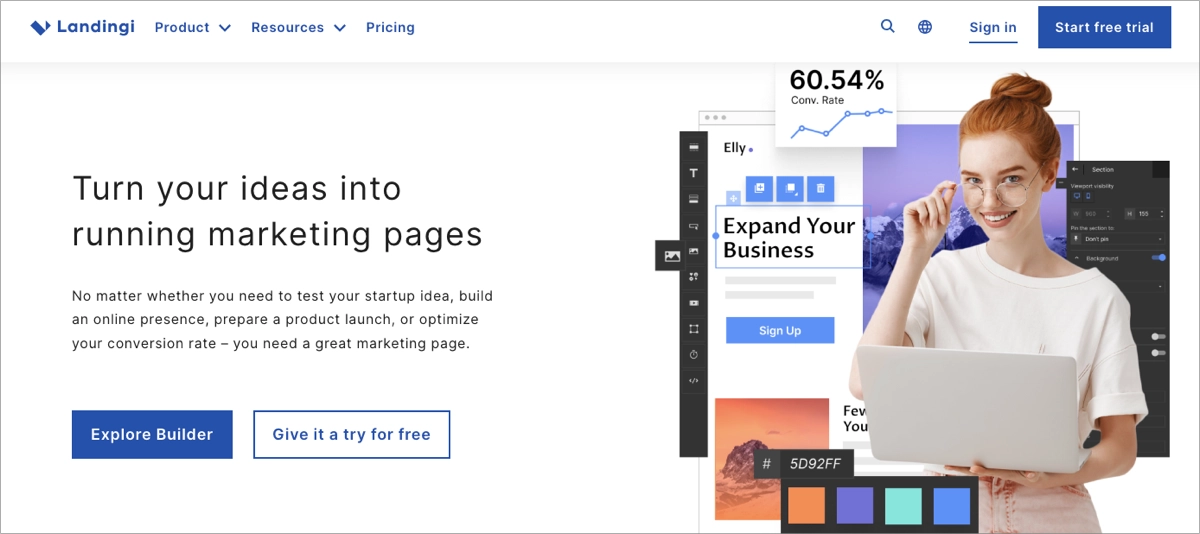
Landingi offers over 400 customizable templates for various industries, designed to help you achieve your specific goals. Its user-friendly editor includes AI landing page features that can help you generate content for entire landing pages in 29 languages, also supporting the RTL page creation process. An AI-driven SEO tool helps meet search engines’ requirements, while automated mobile-view creation allows you to craft mobile-friendly pages within minutes.
Without ongoing optimization, landing pages may not be as effective. The Landingi platform provides the best built-in tool for A/B testing, which lets you experiment with various page versions to find the best-performing one. With the EventTracker tool, you can track user behavior and events on your pages, which allows you to gather data needed to make informed decisions about further optimization. Landingi offers over 170 integrations with various marketing platforms, which makes it a highly valuable tool for marketers driving SEO and PPC strategies and wanting to expand their existing toolkit with a landing page tool.
Organic vs. Paid Search Statistics
While both SEO and PPC strategies benefit businesses, comparing statistics can reveal significant insights into user behavior and campaign effectiveness. Delve into the key metrics and trends, highlighting both search strategies’ advantages and limitations.
The same source highlights that more than two-thirds (68.7%) of all clicks are directed to the top three organic search results, and appearing in the top position on the first page of Google SERP gives a 39.8% organic click-through rate. It underscores SEO’s significance and shows that organic search can drive substantially higher user engagement than paid search.
Despite 94% of users skipping search ads in favor of organic results, as demonstrated by RankPay’s statistics, data shows that PPC drives relatively high conversion, showcasing paid search campaigns’ potential. The average return on investment for PPC ads is 200%, which means that for every $1 spent, you get a $2 return.
Even though investing in SEO brings long-term results and helps build a brand’s credibility, paid ads can increase brand awareness by even 80%, as stated by WebFX.
When Should I Use PPC Over SEO?
You should use PPC over SEO when you need immediate visibility and quick results, such as during a product launch, a time–sensitive promotion, or to quickly drive traffic to a new website. PPC is also advantageous when targeting highly competitive keywords where organic ranking is difficult to achieve in the short term.
Additionally, PPC allows for precise audience targeting and budget control, making it ideal for campaigns with specific demographics or geographical focus. If you have a flexible budget and seek measurable, short-term ROI, PPC can provide the rapid impact and detailed analytics necessary for immediate marketing goals.
Boost your brand awareness with PPC – use Landingi and optimize your campaigns for the best results.
When Should I Use SEO Over PPC?
You should use SEO over PPC when aiming for sustainable, long–term online visibility and cost–effective traffic. SEO is ideal if you have a limited budget but can invest time in improving your site’s organic ranking. It’s beneficial for building brand credibility and trust, as users often perceive high organic rankings as more trustworthy.
SEO is preferable for targeting informational queries where users seek detailed, valuable content. It is the optimal choice for businesses looking to establish a strong, enduring online presence and capitalize on steady, ongoing traffic without continual ad spend.
What Are the Cost Differences Between PPC and SEO?
The cost differences between PPC and SEO are significant: SEO relies on organic traffic, where investments are mostly limited to hiring a specialist or purchasing necessary tools, while PPC, beyond these costs, requires constant ad spending to drive traffic. Overall costs in both strategies depend on several factors described below.
SEO costs
SEO is cost-effective in the long run compared to other digital marketing strategies. It is an investment that pays off over time. You won’t see immediate results, but once you achieve strong rankings, organic traffic can be a reliable and cost-effective source of website visitors.
- Variable costs
SEO costs can vary depending on your approach. To minimize costs, you can do basic SEO tasks (keyword research, on-page optimization), leveraging free or affordable SEO tools. However, you might hire an SEO agency or freelancer for a comprehensive SEO strategy. Agency fees typically range from $1,500 to $5,000 per month, with costs potentially higher or lower depending on the agency’s expertise and project scope.
- Indirect costs
Time is a significant factor in SEO. Whether doing it yourself or working with an agency, you must invest time in research, content creation, and ongoing monitoring.
PPC costs
PPC involves direct payment for each click on your ad. Leveraging PPC ads often involves other costs, like investing in professional tools or hiring PPC experts, unless you don’t manage campaigns yourself. Check out the detailed PPC cost overview below.
- Direct costs
The PPC model operates on charging a fee each time your ad is clicked. You set a budget and bid on keywords, determining your overall advertising spend. The cost per click (CPC) can vary depending on the competitiveness of your keywords, industry, advertising platform, and other factors.
According to WebFX statistics, the average CPC across various PPC advertising platforms in 2024 is the following:
1. Google
Avg. CPC (cost per click): from $0.11 to $0.50
2. Amazon
Avg. CPC (cost per click): from $0.81 to $2.00
3. Facebook
Avg. CPC (cost per click): from $0.26 to $0.50
4. Instagram
Avg. CPC (cost per click): from $0.0 to $0.25
5. YouTube
Avg. CPV (cost per view): from $0.31 to $0.40
6. LinkedIn
Avg. CPC (cost per click): from $2.0 to $3.0
- Potentially high costs
PPC campaigns can become expensive quickly, especially for highly competitive keywords. If your bids are too high or your campaign isn’t well-optimized, you can easily burn through your budget.
- Ongoing costs
Unlike SEO’s long-term benefits, PPC traffic stops when you stop paying. You must continually invest in advertising spend to maintain website traffic through PPC.
Many businesses utilize a combination of SEO and PPC. SEO lays the foundation for organic traffic, while PPC provides a targeted boost to reach your audience quickly. The ultimate cost consideration should be ROI. Both SEO and PPC can be valuable, but the best choice depends on which strategy delivers the best return on your investment.
What Are the Short-Term Benefits of PPC Over SEO?
The short-term benefits of PPC compared to SEO include immediate visibility and traffic, as PPC ads appear at the top of search results shortly after the campaign launches. This rapid deployment is ideal for time-sensitive promotions or product launches.
PPC allows precise audience targeting, ensuring ads reach specific demographics, locations, or devices, thanks to which ads become highly effective right when launched. Additionally, PPC benefits include instant feedback through detailed analytics, enabling quick adjustments to optimize performance. Unlike SEO, which can take months to impact rankings, PPC offers fast, measurable results, driving quick conversions and immediate ROI.
What Are the Long-Term Benefits of SEO Over PPC?
Compared to PPC, SEO’s long-term benefits are sustained organic traffic and cost-effectiveness. Once a website or specific landing page achieves high rankings, it can maintain visibility without ongoing ad spending, making SEO more economical over time.
SEO enhances brand credibility and trust, as users often perceive organic results as more authoritative. It provides lasting value through quality content that continues to attract visitors. Additionally, SEO‘s cumulative effects build a solid online presence, driving consistent traffic and generating leads long after initial efforts, unlike PPC, which ceases to deliver traffic once the budget is exhausted.
How Do PPC and SEO Complement Each Other?
PPC and SEO complement each other by providing a comprehensive approach to online marketing that leverages the strengths of both strategies – immediate results of PPC and long–term growth of SEO. PPC offers immediate visibility and quick results, driving traffic and conversions while SEO efforts are still ramping up and generating organic traffic.
Immediate boosts caused by PPC campaigns can help gather data on high-performing keywords, which can then inform and refine SEO strategies. SEO, on the other hand, builds long-term organic visibility and credibility, which can sustain traffic and engagement over time. When combined, the data from PPC campaigns can help identify effective keywords and user behaviors, optimizing both paid and organic efforts. Additionally, both strategies ensure continuous visibility, with PPC ads capturing immediate attention and organic listings reinforcing trust and authority.
Together, PPC and SEO can maximize overall search engine presence, improve click-through rates, and provide a balanced, cost-effective approach to achieving both short-term and long-term marketing goals. This integrated approach ensures that a brand is visible to potential customers at all stages of the buying journey, from initial awareness to final conversion.
Craft attractive landing pages and maximize your business’s online presence.
How Do PPC and SEO Impact Brand Awareness?
PPC and SEO significantly impact brand awareness by attracting targeted audiences and ensuring a brand’s presence across search engine results, catering to both immediate and long-term visibility needs.
PPC campaigns increase brand awareness quickly by placing ads at the top of search results, on relevant websites, or across social media platforms. Such prominent placement ensures that users frequently see the brand, even if they don’t click on the ads. The visual exposure helps reinforce brand recognition and recall, making it an effective strategy for introducing new products or entering new markets.
SEO, on the other hand, contributes to brand awareness by improving organic search rankings. High-quality, keyword-optimized content helps a website or a landing page appear in relevant search results, building authority and trust over time. Consistent organic visibility ensures that users encounter the brand repeatedly during their search journeys, reinforcing familiarity and credibility.
Together, PPC and SEO create a holistic approach to brand awareness. PPC provides immediate, targeted exposure, while SEO builds sustained, trusted visibility. This combination ensures comprehensive coverage, reaching potential customers at various touchpoints and stages of their decision-making process, ultimately enhancing overall brand recognition and reputation.
How to Balance a Marketing Budget Between PPC and SEO?
Balancing a marketing budget between PPC and SEO involves strategic planning and understanding business goals, timelines, and target audience behavior. Check out a short, 6-step guide below to learn how to balance your marketing budget properly:
#1 Set Clear Goals
Firstly, set clear goals and determine what you want to achieve with your marketing efforts. If you need immediate results and quick traffic, allocate more to PPC. Focus on SEO for long-term growth and sustained visibility.
#2 Analyze Data
Secondly, analyze data to understand which channels have previously driven the best results. Use analytics to assess the performance of past PPC campaigns and SEO efforts and adjust your budget accordingly.
#3 Focus on the Business Cycle
Thirdly, focus on the business cycle. If you’re launching a new product or running a seasonal promotion, prioritize PPC for its immediacy. During periods of steady growth, shift more resources to SEO to build organic traffic.
#4 Test and Adapt
Fourthly, test and adapt your strategy. Start with a flexible budget that allows for adjustments. Monitor the performance of both PPC and SEO regularly, and be ready to reallocate funds based on what’s working best.
Test, track, and optimize your landing pages to achieve the best results in both PPC and SEO.
#5 Leverage Synergies
Fifthly, leverage synergies and use insights from PPC to inform SEO strategies, such as identifying high-performing keywords. Conversely, use SEO to improve the Quality Score of your PPC campaigns, reducing costs and improving ad placement.
#6 Consider Industry and Competition
Sixthly, consider the industry and the competition. In highly competitive industries, PPC might require a larger budget share due to higher costs per click. Conversely, if your industry has less competition, SEO might offer a more cost-effective path to visibility.
By carefully analyzing these factors and maintaining flexibility, you can effectively balance your marketing budget between PPC and SEO to maximize overall performance and ROI.
Why Should I Track Organic and Paid Search Keywords?
You should track organic and paid search keywords to gain insights into which keywords drive traffic, conversions, and engagement. This data helps refine your SEO efforts, ensuring you’re targeting the most effective terms for organic growth. Simultaneously, it allows you to optimize PPC campaigns by identifying high-performing keywords that justify investment. Additionally, tracking these keywords can reveal gaps and opportunities, ensuring a cohesive strategy that maximizes visibility, reduces costs, and enhances ROI.
How Do Algorithm Changes Affect PPC and SEO Differently?
Algorithm changes affect PPC and SEO differently due to the distinct nature of each strategy. SEO is more directly impacted by search engine algorithm updates, as these changes can transform how websites are ranked organically. This can lead to fluctuations in search rankings and traffic, requiring continuous optimization and adaptation to maintain or improve positions.
Conversely, algorithm changes affect PPC less, as paid search placements are determined by bids and Quality Scores rather than organic ranking factors. However, Quality Score criteria or ad policy changes can still influence PPC campaign performance and costs.
Which Is Better, PPC or SEO?
Deciding whether PPC or SEO is better depends on your specific goals, budget, and timeline. PPC offers immediate visibility and quick traffic, making it ideal for time-sensitive campaigns, product launches, or businesses needing rapid results. It provides precise targeting and measurable ROI but requires continuous investment.
SEO, on the other hand, is a long-term strategy that builds sustainable organic traffic and enhances brand credibility. It’s cost-effective over time but requires patience and ongoing effort to see results. For most businesses, a balanced approach using both PPC and SEO is optimal, leveraging the immediate benefits of PPC while investing in the lasting impact of SEO.
What Tools Are Best for Managing PPC and SEO Campaigns?
The best tools for managing PPC and SEO campaigns include top tools for paid advertising, like Google Ads and SEMrush, professional SEO software, like Google Analytics and Ahrefs, and the best tool for landing pages, Landingi. Check out our list of the most valuable digital marketing tools below.
Google Ads
Google Ads is a platform for PPC marketing, where you create and manage your Google Ads campaigns. It offers keyword research tools and basic performance metrics. Additionally, it provides advanced features such as audience targeting, ad scheduling, and budget management to help maximize the effectiveness of your campaigns.
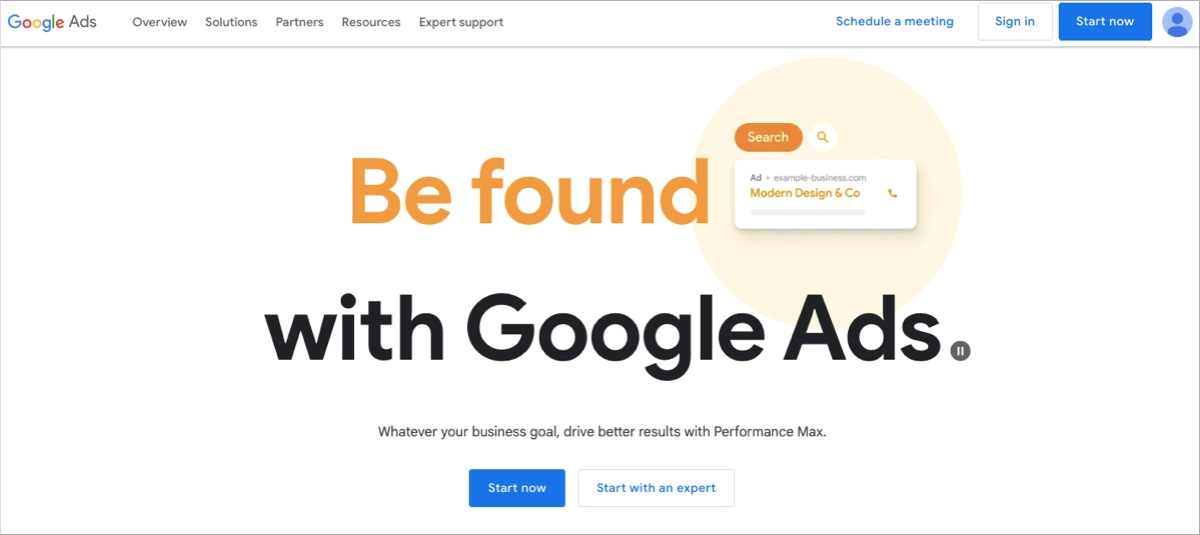
SEMrush
SEMrush is an all-in-one marketing platform with robust features for PPC campaign management, keyword research, competitor analysis, and more. It also offers a comprehensive suite of SEO tools to track and optimize digital marketing efforts, including site audits, on-page optimization suggestions, and more. With SEMrush, businesses can gain valuable insights into market trends, monitor competitor strategies, and refine their own campaigns to achieve better results and higher ROI.
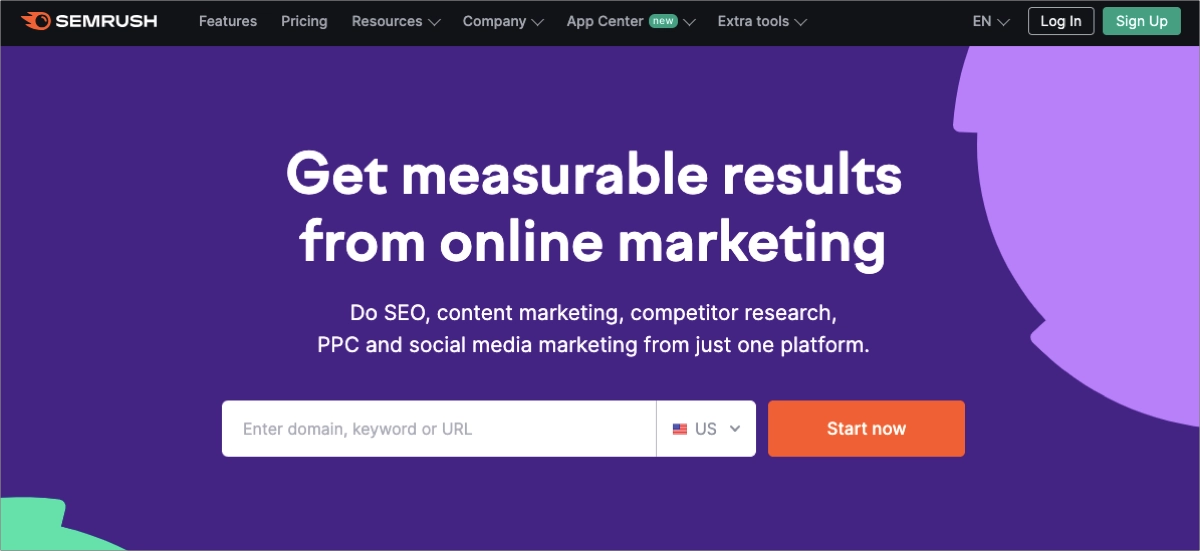
AdEspresso
AdEspresso by Hootsuite is a user-friendly platform for creating and managing PPC campaigns across multiple platforms, including Google Ads and Facebook Ads. It simplifies the ad creation with templates and offers advanced features like split testing, audience targeting, and detailed analytics. AdEspresso also provides actionable insights and optimization recommendations, making it easier for businesses to maximize their ad performance and ROI while saving time on campaign management.
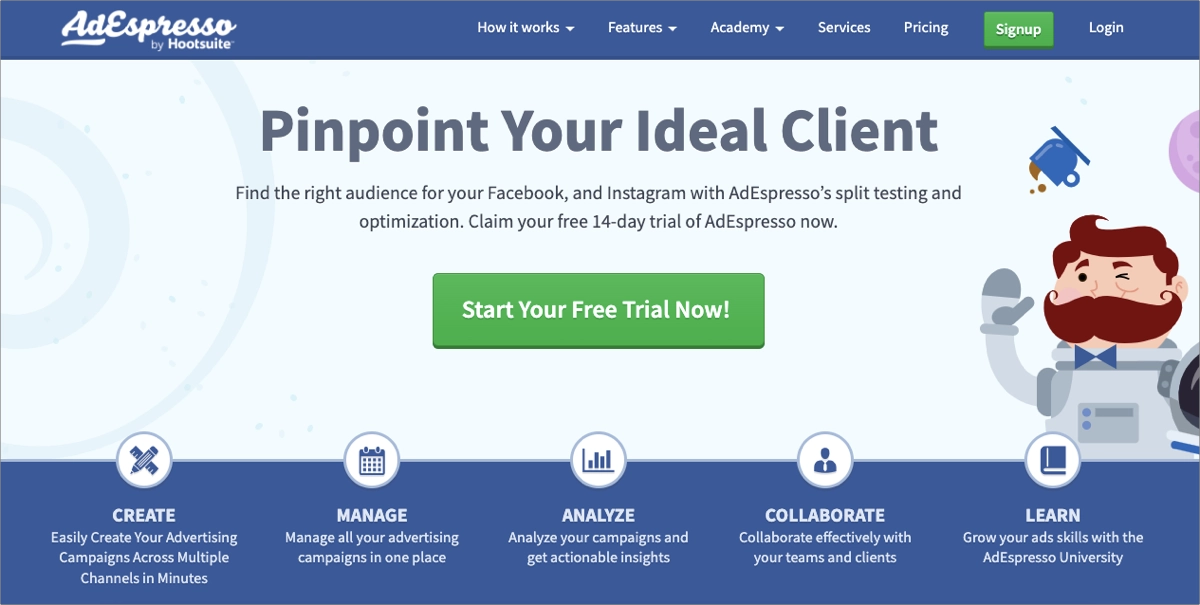
Google Analytics
Google Analytics: Another free tool from Google that offers a wealth of data on your website traffic, including sources, user behavior, and conversions. It provides detailed insights into how visitors interact with your site, helping you understand which marketing efforts are most effective. With features like real-time reporting, goal tracking, and custom dashboards, Google Analytics allows businesses to monitor performance, identify trends, and make data-driven decisions to optimize their online presence and improve overall user experience.
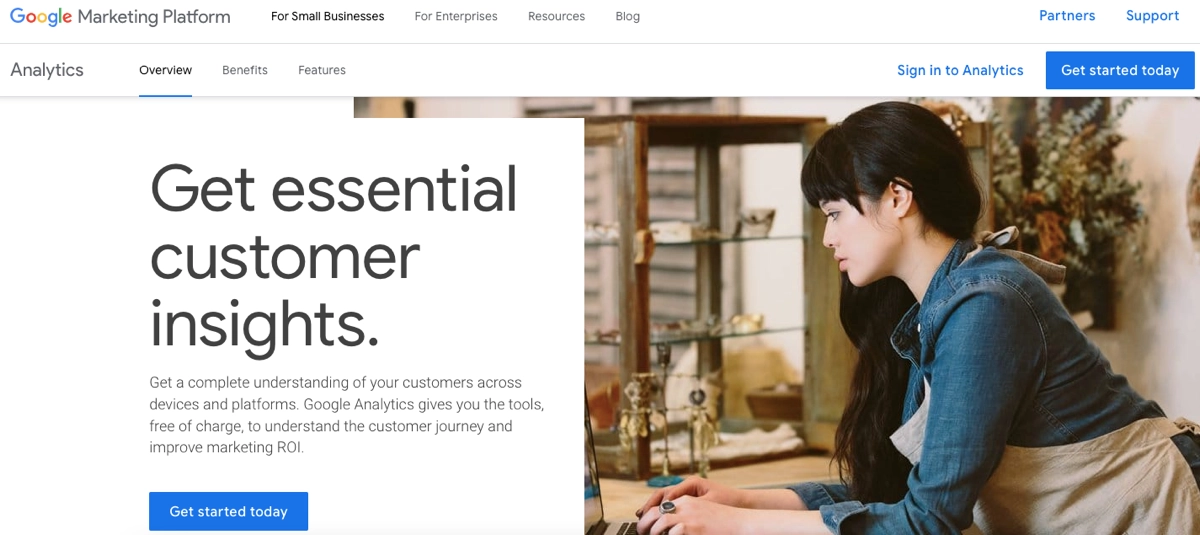
Ahrefs
Ahrefs is a popular SEO platform with powerful features for keyword research, backlink analysis, and technical SEO audits. It offers comprehensive tools to analyze your website’s SEO performance, uncover content gaps, and identify high-performing keywords. The platform also provides in-depth site audit reports, allowing you to detect and fix technical issues that could impact your search rankings, making it an essential tool for SEO professionals.
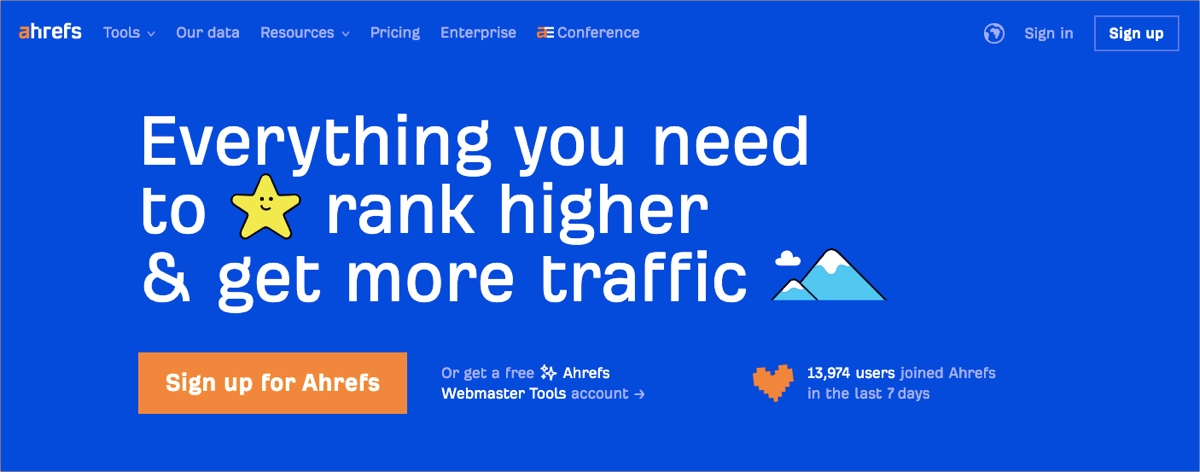
Landingi
Landingi is a top-choice tool for creating, testing, optimizing, and managing your landing pages. The platform provides an easy-to-use page builder with AI landing page features to help you create attractive content that meets search engine algorithm requirements.
Use Landingi and start crafting, testing, and optimizing your landing pages today!
Landingi offers an A/B testing tool for comparing different versions of pages to determine which performs better regarding user engagement and conversions. With its built-in EventTracker tool, you can track events and check user behavior to make informed decisions on further optimization.
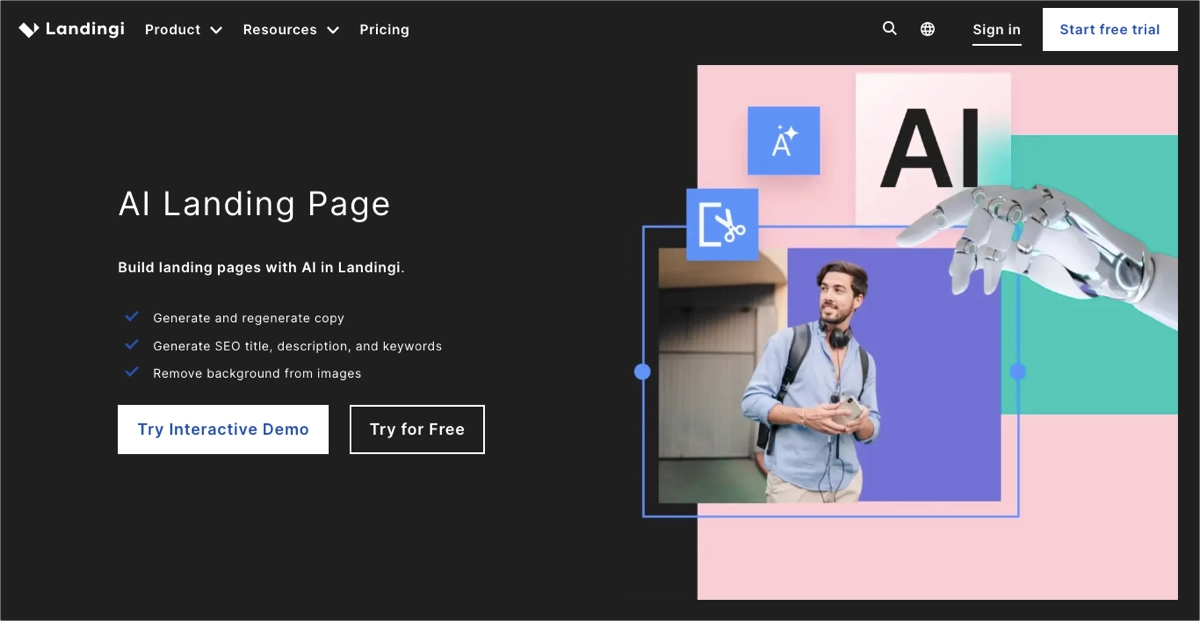
Landingi is a must-have tool for running SEO and PPC strategies based on landing pages. With this professional solution, you can ensure each page is well-designed and optimized to drive conversions. Landingi also offers over 170 integrations, thanks to which you can leverage the full potential of this digital marketing platform, connecting its functionality with your existing toolkit.
Leverage the Potential of SEO and PPC Strategies with Landingi
PPC provides immediate visibility and precise targeting, making it ideal for quick results and time-sensitive campaigns, while SEO, on the other hand, builds long-term organic traffic and enhances brand credibility, though it requires patience and ongoing effort.
Consider the pros and cons of both strategies and leverage the best digital marketing tools to create a perfectly balanced digital marketing strategy for your business. Use PPC ads to boost your brand awareness and promote new products or services, and focus on SEO to build your brand’s credibility and organic visibility that will last long. To achieve the best results and drive high conversion, create well-optimized landing pages, also for PPC ads – try Landingi now and discover the full potential of strategies based on landing pages.
